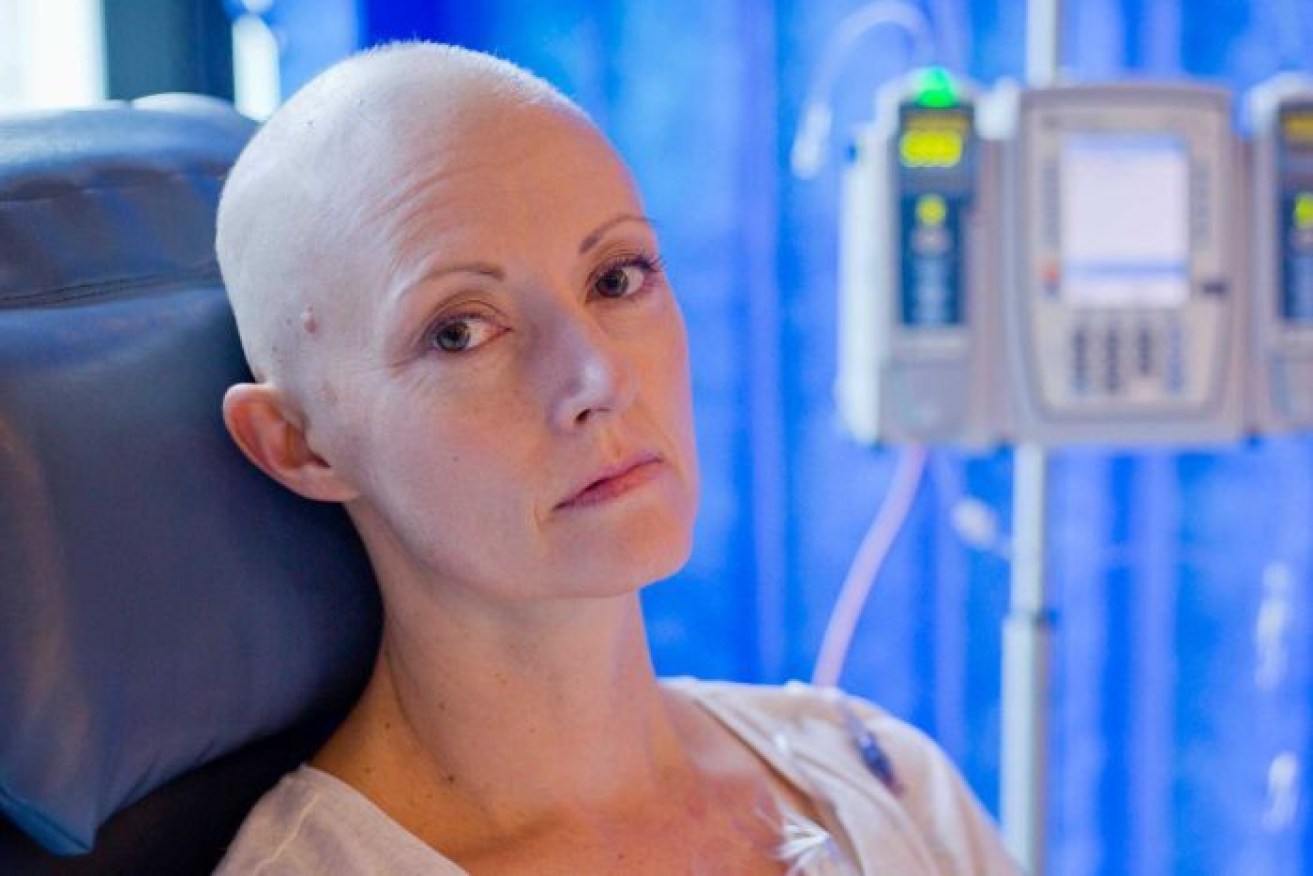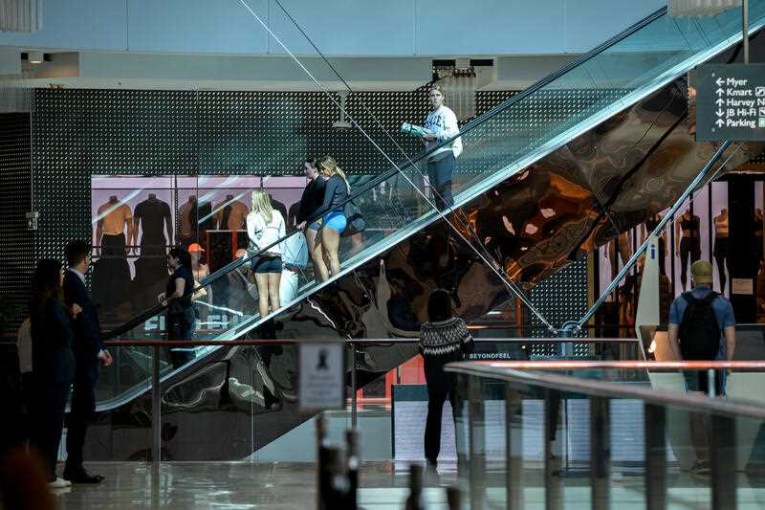Chemotherapy patient explains how you can help save her from coronavirus

Journalist Mary Lloyd, who was diagnosed with breast cancer last year, is imploring others to take advice on coronavirus protection measures seriously. Photo: Hugh Riminton/ABC
It has been a strange feeling hearing my possible death openly labelled inconsequential by public figures, commentators and even by some of my friends.
Some remark that coronavirus has “only a 1-4 per cent” fatality rate, while others implore that everyone relax because “most people will only get mild symptoms”.
These statements are broadly correct, but there’s a callous confidence that comes with knowing you’re part of the 96 per cent who will survive an infection – instead of being among the potential “four-percenters” who might not.
Of course their comments are not aimed directly at us, but I cannot help wondering whether they know we’re listening.
Last year I was diagnosed with breast cancer.
I had it removed and am now enduring four months of chemotherapy to keep me cancer-free.
I’m seven weeks into my treatment and every time I receive a dose of the cancer-killing stuff, it also knocks out part of my immune system.
Last week, I picked up a viral throat infection from one of my kids and ended up at Sydney’s St Vincent’s emergency department after the symptoms escalated worryingly.
It was a real wake-up call.
If I’m to fight off a viral infection, it is my lymphocytes I’ll be relying on.
The normal range for a healthy person is a count between 1.5 and 4.
When my blood was tested by the emergency department halfway through my third chemo cycle, it showed my lymphocyte count had dropped to 0.6.
A reading that low does not mean I have no immune system to rely on, but it does leave me genuinely concerned that if I contract COVID-19 I might not be among the group who experience only mild symptoms.
I am by no means the only one with this worry.
As someone older and infirmer, I am not loving all the it’s “only” us who will die from the virus. I am quite nice, still moderately useful, occasionally funny and I have no franking credits … so please may I live a little longer ?
— Trisha Barraclough (@PMBarraclough) March 8, 2020
When retired broadcaster Patricia Barraclough, who described herself as an “older” person, posted on Twitter that she felt uncomfortable seeing posts about it being “only” the elderly and those with underlying health conditions who will die from the virus, her sentiments were seconded by a range of mature people.
This was echoed by those with chronic asthma and compromised immune systems.
“I’m with you Patricia,” Jenny Harrison, another “older” person wrote.
“I do feel rather expendable when they keep saying that.”
I don’t just feel expendable, I feel exposed.
My best protection right now is to avoid coming into contact with the virus entirely, and my best chance of that happening is if it is not spreading within my community.
For that to happen, us potential 4 percenters are depending on hundreds of thousands of random strangers to be vigilant and take sensible precautions, not because they are worried they might die of the disease, but because they care enough about potentially thousands of vulnerable people who could.
Right now, we are not feeling that love.
Seems horribly lacking in any humanism. Will it change behaviour?
How about some strong messaging that we must act, because if certain people get it they will die.
It’s the people, stupid.#COVID19Aus #auspol https://t.co/W6u790CnDO
— Mary Lloyd 🇿🇦🇦🇺🇳🇿📷🎥🖊 (@MaryLloyd4) March 14, 2020
When people spread blithe messages about the fatality rate or flippantly comment about easily shaking the disease off, there is a risk others will take a similar careless approach.
Less care in the community will lead to more infections.
This is where it becomes truly terrifying for potential four-percenters: If so many people contract the virus that the healthcare system becomes overwhelmed, we cannot be sure we will receive the care we need.

Mary Lloyd, her husband Hugh Riminton and their three children outside a cancer centre in Sydney on the first day of her chemotherapy treatment. Photo: ABC News
Look at Italy. The death rate there is alarmingly high, not because the virus is more virulent, but because doctors are having to make that most dreadful of decisions.
They are having to “pick winners”, which means taking account of patients’ underlying health conditions and deciding who gets access to scarce resources like ICU beds, ventilators and ECMO machines (blood-pumping machines).
Those less likely to survive are by necessity left to die.
I’m expecting to fully recover from my underlying health condition, but if I contract coronavirus at the height of this outbreak, can I be sure in a contest between myself and another patient I will hold the winning ticket?
Of course, I’d rather not find out, for their sake as well as mine.
So instead of relying on the health system to be adequately equipped if I do succumb, I am left reliant on people like my neighbour Sarah.
Last week she had a sore throat and insisted on staying two metres away from me, and immediately got herself tested.
She did it not for the sake of her own health, but to protect me and her ageing father.
And I’m hoping people will take note of the signs at places like Sydney’s Kinghorn Cancer Centre asking them not to enter the building if they are experiencing symptoms that could put chemo patients at risk.
If over the next few days, however, it does not feel like Australians as a community of people are committed to staying away from large events, practising social distancing, supporting people to work from home, and keeping the virus out of schools, I will be taking action to isolate myself and my family until it is all over.
What we are faced with is a public health risk, not a risk to every individual’s life.
We need to respond accordingly.
So on behalf of all the potential four-percenters out there, I beg that people be vigilant and take the virus seriously, not because we are all potential fatalities, but because among us there are people whose best chance of surviving the outbreak is if its spread is slowed so our health system can adequately treat everyone in need.
Or better still, if they do not come into contact with the virus at all.
Mary Lloyd is a multiplatform producer and journalist for the ABC’s Specialist Reporting Team.








